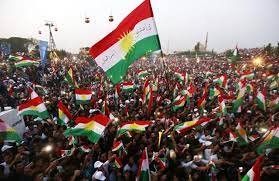KDP wins Kurdistan election amid higher voter turnout
The Patriotic Union of Kurdistan is second, followed by the New Generation Movement. Voter turnout is up, 72 per cent against 51.4 per cent in 2018. In Ankawa, the mayor of the Christian suburb beats the candidate of the pro-Iran Babylon Movement to win a minority seat.
Erbil (AsiaNews) – The Kurdistan Democratic Party (KDP) has won most votes in Sunday’s Kurdistan regional elections. The last election was held in 2018 but was postponed for two years.
The KDP won 809,197 votes, almost twice as many as its main rival, the Patriotic Union of Kurdistan (PUK), which receive 408,141, this according to the Iraqi Independent High Electoral Commission (IHEC). The New Generation party, the region's largest opposition group, came third with 290,991 votes.
Seats have not yet been assigned because of legal challenges to the results. Ali Hama Salih, leader of the National Stance Party, is alleging that his party was the victim of electoral fraud and has announced legal action against the IHEC.
He is not alone. Several complaints have been made of vote manipulation, and could derail the official proclamation of the results, and the related allocation of seats, which must wait for all pending appeals to be settled.
Munira Ali Abdul Aziz, a member of the politburo of the Islamic Movement in Iraq (IMK), also rejected the outcome of the vote. On social media, he described the process as "pre-designed and fraudulent". According to preliminary results , the IMK is shut out of parliament.
In this election, the Christian vote is also in the spotlight, especially after the number of seats reserved for minorities was reduced, and self-styled leader Rayan the Chaldean and his Iran-backed Babylon Movement tried to conquer the leadership of the Christian community.
Christian Assyrian, Chaldean, Syriac, and Turkmen groups each won one seat in the provinces of Erbil and Sulaymaniyah, while Christians also won a seat in Duhok.
Ramy Noori Syawish, current mayor of Ankawa, Erbil’s predominantly Christian suburb, won the Christian seat in the capital of Iraqi Kurdistan beating the pro-Tehran candidate.
The 2024 parliamentary elections were held last Sunday two years later than scheduled because of a row over election rules, not to mention local issues.
In February, Iraq's Supreme Court amended the Kurdistan Region's election legislation (Law 1, 1992), cutting the number of seats from 111 to 100, and removing 11 seats reserved for minorities, a highly controversial move.
The Court also stripped the Kurdistan Region’s electoral commission of its authority, giving it to the Iraqi Independent High Electoral Commission (IHEC). The Court’s elections branch subsequently ordered the IHEC to allocate five seats to minorities: three to Christians (two Assyrian, one Armenian) and two to Turkmen; it also said that women must comprise at least 30 per cent of elected members.
Some 2,899,578 voters were eligible to choose from two alliances, 13 parties and 124 independent candidates.
Members of the Peshmerga and Internal Security agencies, about 215,560 eligible voters, were able to vote last Friday, and 208,521 (97 per cent) cast their ballot.
At a press conference in Baghdad, an IHEC spokesman said that more than two million people went to the polls.
Overall turnout was substantially higher than in 2018, 72 per cent against 51.4 per cent, with the highest percentage in Dohuk (78 per cent), followed by Erbil 74 per cent; Sulaimani, 65 per cent; and Halabja, 69 per cent.
One of the first reactions came from the US embassy in Baghdad. The US is still militarily present in Iraq, which the Iraqi government would like to end it, except for Kurdistan, a second-best solution, but acceptable to all parties.
The embassy congratulated the Kurdistan Region on the smooth execution of the elections, stressing the importance of forming a new government to boost democratic institutions, advance human rights, and promote economic growth.
Kurdistan Region President Nechirvan Barzani echoed those sentiments, praising the peaceful and competitive nature of the poll. He urged political parties to swiftly form a new government prioritising stability, economic resilience, and the protection of citizens' rights.
The election was held against a backdrop of a growing economic crisis, exacerbated by the suspension of oil exports, a critical revenue stream for the Kurdistan Regional Government (KRG) blocked by Turkey in March 2023.
This decision is linked to a ruling by the International Chamber of Commerce requiring Turkey to pay Iraq US.5 billion for unauthorised oil exports from the Kurdistan Region.
US State Department Deputy Spokesperson Vedant Patel highlighted the importance of the high voter turnout and the absence of significant security incidents during the election.
Now attention is turning to the political forces in the Kurdistan Region and how they will navigate these issues and secure stability.







.png)










